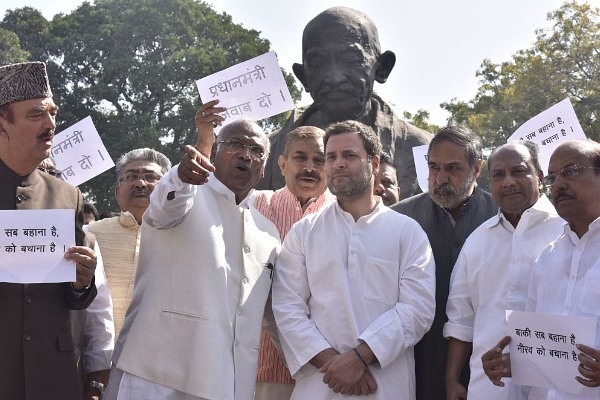
Why Opposition’s No-Confidence Motion Is Likely To Backfire
The timing of the motion is ill-conceived as Modi can now point to several measures that he has taken towards resolving such issues as farmer distress and unemployment.
“Victorious warriors win first and then go to war, while defeated warriors go to war first and then seek to win.” – Sun Tzu, The Art of War
The opposition’s move to pass a no-confidence motion against the Narendra Modi-led National Democratic Alliance (NDA) government is yet another political battle that is likely to put the Prime Minister in a position of strength. This could benefit the Bharatiya Janata Party (BJP) before the key assembly polls slated for later in the year. Even as the opposition is struggling to cobble together an agenda beyond the “unseat Modi” rhetoric, the Prime Minister has been holding video conferences and public meetings, and is launching development initiatives in July. This effort has brought back the attention of the public towards the achievements of the Modi government.
The BJP’s “Sampark For Samarathan” campaign has also boosted its image as far as the government's performance in the last four years is concerned. Amit Shah's outreach to his allies Shiv Sena and Akali Dal might have addressed the disagreements within the NDA. The momentum for a showdown has been built over the past two months to take on the opposition in the monsoon session of Parliament, and a strong pitch for the anti-Triple Talaq Bill has placed the BJP in pole position to outmanoeuvre the opposition parties in Parliament.
The reluctance of the BJP to accept the motion in the budget session of Parliament appears to be a pragmatic decision, in retrospect. The narrative prevalent in the run-up to the budget was visibly anti-government, with several issues making the headlines. The Kisan Long March to Mumbai in March had especially attracted the attention of the country on farmer distress in the country. The government seemed to be on a weak wicket to defend itself on the issue of jobs and farmer distress on the floor of Parliament as well as elsewhere.
The recent announcement over the hike in minimum support prices is likely to be presented as a resolution to the issue of farmer distress. At the same time, the opposition will be at the receiving end of criticism for not implementing the Swaminathan Committee recommendations in the past.
The hue and cry over lack of jobs seems to have been addressed by the publicity given to the payroll study conducted by the Indian Institute of Management (IIM) professor Pulok Ghosh and State Bank of India (SBI) chief economist Soumya Kanti Ghosh. The study had unraveled the loopholes in the official jobs data and claimed that job creation could be much higher than what is reported by government agencies.
Fair to say, the Prime Minister is not one who “goes to war and then fights the battle”. In stark contrast, the opposition has walked into this exercise without any widespread public outreach or serious introspection over its position in the current scenario. When asked why the Congress had been targeting the Prime Minister, in an interview to Times Now, Jyotiraditya Scindia of the Congress said the Prime Minister was the face of the government and so, therefore, they had no option but to attack him. But this is likely to be counterproductive. Prime Minister Modi, in his interview to Swarajya, had said, “They have no agenda except to remove Modi”. This is likely to reinforce the “Modi versus all” perception as India moves closer to the 2019 Lok Sabha election.
As far as the numbers are concerned, the BJP has already won, and the opposition has already lost. In spite of Sonia Gandhi's dubious claim, “who says that Congress doesn't have the numbers?", the fight between the two sides is now for setting the narrative. The BJP and the Prime Minister will once again discuss its report card and point to the bankruptcy of the opposition in the no-confidence motion debate. The triple talaq issue and the Congress' stand on the matter will be highlighted, even if the “Muslim Party” attack might be skipped for the sake of Parliamentary decorum.
The opposition’s vague claims on jobs, farm distress, intolerance, and lynchings are unlikely to strike a chord. Painting the entire country as intolerant based on unfortunate crimes in some parts of the country is an argument which is not only illogical but also points to a lack of maturity on part of Rahul Gandhi. The alleged “injustice to Andhra Pradesh” is unlikely to hold water in the rest of the states in the country.
On the other hand, the motion provides an opportunity to the BJP to clarify facts about its work in the state. The fervent hope of “opposition unity” may also fail to materialise in Lok Sabha during the discussion over the no-confidence motion.
Considering the fact that the Prime Minister is a fine orator, there is little doubt about the likelihood of him hitting the no-confidence full-toss for a big six. It will only result in the electorate gaining confidence in Modi ahead of the crucial assembly polls in Madhya Pradesh and Chhattisgarh.